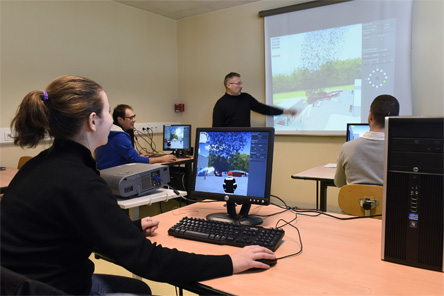Industrial risk control (MRI)
Industrial Risk Control Department - taught on the Bourges campus
The MRI speciality is defined by a systemic risk approach (cindynics, or risk analysis). MRI engineers at the INSA Centre Val de Loire are multidisciplinary engineers focused on the control of industrial risks. They are trained in different types of risk: preventive and corrective action, respect for work and the environment, corporate responsibility, major and external risks.

© INSA CVL
Each catastrophe provides an intermittent reminder that the impossible can happen. By the 1990s, perception, understanding and management of risk had progressed to the point of bringing about the science of risks, coined cindynics, or more commonly referred to as risk analysis. Making a clean break with the past, risk analysis seeks to find out more about danger and risk through stringent systemic and comprehensive approaches. It therefore combines methods to illustrate the risk, its development and its prevention with a view to setting up all of the necessary organisational processes upstream: decision, management, communication, production, analysis, alert, etc.
Industrial Risk Control Engineers at the INSA Centre Val de Loire are trained in the various aspects associated with managing the risks inherent in a company and its business. Risk management encompasses: preventive and corrective action, safety of people and property, environmental impacts, corporate responsibility, major and external risks.
Three Advanced Modules in Year 4
- ME: Mechanical and Energy Engineering
- SA: Advanced Systems
- GP: Process Engineering
Five Options in Year 5
- RAI: Industrial Accidents and Risks
- EN: Nuclear Energy
- RE: Environmental Risks
- RSI: Industrial Systems and Risks
- TPR: Transport, Production, Robotics
Programme domains
- Mechanical engineering
- Energy engineering
- Process engineering
- Automatic control
- Systems engineering
- Robotics
- Image and signal processing
Test benches put into use to illustrate the theoretical concepts studied during Lectures, Tutorials and Projects:
- Practicals on Solid Mechanics (Strength of Materials, Traction, etc.)
- Practicals on Fluid Mechanics (Pressure losses, capillary viscometer, etc.)
- Simulator of industrial accidents
- Practicals on Process Engineering (Distillation, Gas/liquid absorption, Fluidisation and Liquid/liquid extraction)
- Gas and dust explosion chambers
- Study of Systems Engineering
- Regenerative cooling combustion chamber
- Study of Structural vulnerability
- Practicals on Signal and image processing
- Robotics and Nano-robotics test bench
- Electronics practicals
Placements in France and abroad:
- Year 4: placement or industrial assignment lasting 16 weeks
- Year 5: 25-week placement
Compulsory four-month study period abroad
Double degrees
- Double degree with the ISAE-ENSMA
- MARS (Mechatronics, Automatic Control, Robotics and Signal) Master with Orléans University
- MERI (Mechanics and Industrial Risks) Master with Troyes University of Technology
- ECE Master with Orléans University
RAI option:
- Risk Control Engineer
- Fire Protection Officer
- Damage Expert
EN option:
- Nuclear Risk Engineer
- Nuclear Safety Engineer
- Nuclear Engineer
RE option:
- Polluted Soil and Site Research Engineer
- Industrial Hygiene, Safety & Environment Engineer
- Industrial Hygiene, Health, Safety and Environment Engineer
RSI option:
- Dependability Engineer
- Security Design Engineer
- Claims and Damages Engineering Expert
TPR option:
- Rail Reliability Engineer
- Quality, Safety & Environment Engineer

